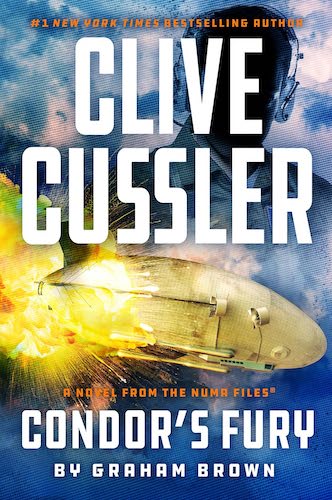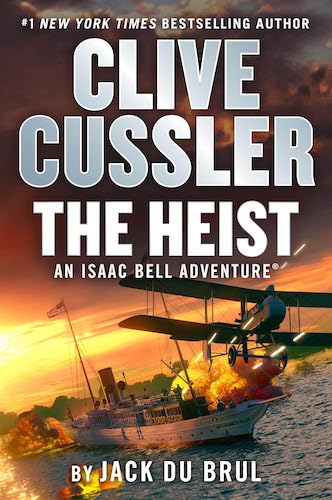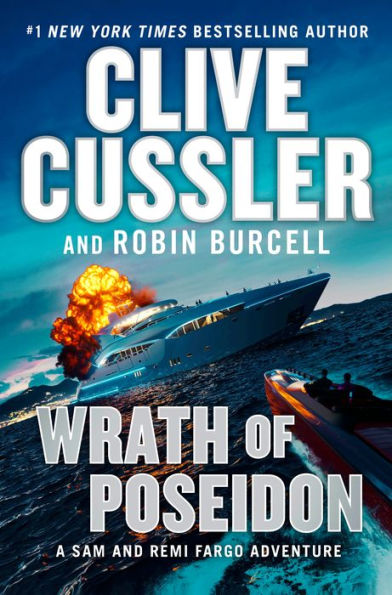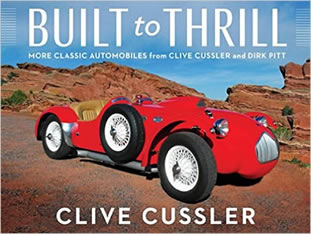Excerpt from:
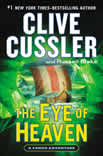 The Eye of Heaven
The Eye of Heaven
by Clive Cussler and Russell Blake
A Fargo Adventure
Coming September 2
Read as a PDF
Flashes of lightning seared the turbid night sky, illuminating the drawn faces of the men heaving on the long wooden oars of the Viking longship as it fought against the ravages of the unforgiving sea. The captain swayed in time with the relentless swell as he watched the wall of towering waves pounding the stern.
Sheer cliffs of black water driven by the icy wind threatened to capsize the hardy craft with each passing minute. Sheets of rain lashed the grim crewmen as they strained at their task, their survival depending on their unflagging effort. The captain eyed them with determination, his brow furrowed as the deluge tore at his skin, water running along the faint white battle scar stretching from the corner of his left eye to his blond beard. He'd grown up on the ocean, one of a hardened race of adventurers and plunderers, and nature's untamed violence was nothing new. Countless nights he'd hurled oaths on the treacherous North Sea, but, even for him, this was a once-in-a-lifetime storm.
The wooden vessel was now badly off course, driven north as it ran with the seas. Had it pressed on its intended route, one of the mammoth waves would have assuredly broken over the bow and capsized the ship, bringing certain death. The best the captain could do was to steer the boat with the wind at his stern and ride out the fury of the gale.
A flare of brilliance streaked through the roiling clouds, glowing momentarily before fading back into the gloom. Salt water dripped from his bearskin cloak as the muscles on his powerful arms bulged from the effort. Another bright flash lit the night. The glowering profile of a carved wooden dragon reflected the light just aft of the captain's head, soaked with the spray blowing off the angry sea.
From among the exhausted oarsmen, a tall man with skin the texture of leather and an untamed red mane lurched his way forward, his footing sure on the coarse oak planks beneath him even in these miserable conditions.
"Thor is venting his fury tonight, eh, Vidar?" the captain shouted to his mate over the howling wind.
"He is indeed, sir. But I think the worst is past. The swells seem smaller than a few hours ago."
"I hope you're right. My arms ache like I've been wrestling a bear all night."
"I know the feeling. You've seen my wife."
The two veteran seamen exchanged humorless smiles, and then the mate edged next to the captain and took the rudder staff from his grip.
"So much for trying to sleep in this nightmare. How are the men holding up?" the captain asked.
"As well as can be expected. Cold. Tired." Vidar didn't say "afraid." It wasn't in these warriors to admit fear.
"They've spent enough time quaffing ale and enjoying the native hospitality. This will give them something to think about in case they've softened like a maiden's robe."
"Aye, Captain. It's definitely putting them to the test—"
A deafening explosion shook the deck beneath them. Both men gazed at the dazzling pyrotechnics with eyes seasoned from a life- time on the ocean and in battle.
The captain glimpsed a shape rising behind him and turned instinctively. They stared as the stern split a massive wave, the rush of the breaking sea the only sound. After a brief moment suspended at the crest, they gradually eased down the back side, the black mon- ster disappearing into the darkness.
"Could you imagine if we'd hit that one square on?" Vidar asked in a hushed voice.
"Or amidships. We'd all be on the way to Valhalla by now." Their eyes drifted to the mast, now shattered and useless, the top half torn away like a twig, along with a major portion of the sail—victim of the stealth with which the storm had hit. That had been a costly miscalculation. He should have lowered the woven wool sheet before the wind could rip it loose. But he'd been trying for every bit of speed possible. His men's arms were strong, but after almost twenty-four hours of rowing, even in shifts, they were reach- ing their limit.
Among the most impressive longships ever launched, Sigrun was built to exacting standards for a crew of ninety, with rowing positions for up to eighty men, two to each of the ship's forty oars, and a detachable mast fifty feet in height. She boasted a length of a hundred twelve feet and a beam of sixteen, a keel hewn from one massive oak, and square stones for ballast. Sigrun could travel at a speed approaching fourteen knots under sail in calm conditions, but during a winter storm of this proportion, in the farthest reaches of the North Atlantic, speed wasn't an issue—staying afloat was.
The Sigrun had a typical Viking lapstrake, double-ender hull, but with a taller gunwale for open-sea expeditions, and its stern and bow were sculpted with identical dragon heads. Ships like Sig-run had a solid track record, navigating some of the most dangerous ocean on the planet, and their seaworthiness and speed were legendary. But even the most durable craft had its limits, and the storm had pushed Sigrun and her crew far beyond anything they'd been through in all their years together.
Long hours passed, and as dawn's first glimmer fought through the heavy gray clouds the seas began to flatten. The captain called out the order for the exhausted oarsmen to rest now that the most dangerous part had passed—and then his eyes spotted a new menace: ice. Fifty yards ahead, an iceberg loomed in the haze, easily the size of a small hill. He twisted to the crewman manning the rudder and yelled a warning.
"Ice! Ahead!"
The ship had a shallow draft, but, even so, the churning waves could push them too near the submerged mass, which would shat- ter the wooden hull and sink the longship, the icy water killing all hands within minutes. The bow swung slowly, the steering sluggish as it resisted the surge of the following seas. Another rolling swell pushed them nearer—too close for the captain's liking.
"Put your backs into it. Pull, damn you, pull or we're done for." The ship glided past the brooding ice as silently as a wraith. The captain's eyes roved over the frozen monolith, an island of desola- tion in the middle of the ocean. He offered yet another silent prayer to the gods. If the ship was in the ice, the storm must have blown them farther north than he'd feared, and the overcast would make it impossible to plot a course using the primitive means at his disposal.
"Bring one of the ravens from the hold," he ordered.
Vidar relayed the command to the nearest crewman, who scut- tled away. The storm surge was nearly spent, and it was time to use one of the Viking seafarers' secret weapons: birds.
Two men heaved a deck hatch open and descended into the forward cargo hold. Moments later, they emerged carrying a rough wooden cage with a large, agitated black form in it. The taller of the two men carried the cage to the captain's station at the stern and set it down on the deck. With a final glare at the sea, the cap- tain squatted on his haunches and eyed the raven.
"Well, my friend, it's time. May you fly straight and true. Don't let me down. Our survival depends on your instincts. Let Odin guide you."
He straightened and gave the crewman a curt nod. "Release it, and wish it Godspeed."
The crewman lifted the cage to chest height as Vidar approached and, after fiddling with the leather binding that held the access door closed, pulled the door open and reached in. The raven flinched, but the fight was out of it, and Vidar easily cornered it with cold hands. He withdrew bird, and then, with a prayer of his own, tossed it into the air.
The raven circled the ship, finding its wings, and then flew to port.
"Be quick about it. Bring the bow around. Follow the raven." Their gazes trailed the black speck as it disappeared into the distance, and they quickly aligned the prow's fearsome dragon head to the bird's flight.
"How many more do we have, Vidar?" the captain asked. "Only one. We lost the other two from shock."
"I know how they must have felt. That storm was one we'll be talking about around the fire when we're old and gray."
"That's the truth. But we made it. And now we know where landfall lies."
"The only question is how far away." "Yes. And how hospitable."
"Probably not warm beaches and willing maidens, I'd wager, judging by the ice and the dropping temperature."
"I suspect you're right."
The men fell silent, lost in their thoughts, their course uncertain for now. Once they found land and the clouds had parted, they could use the sun to plot the way home.
"Order the rest of the men to the oars, Vidar. We need to make speedy time while it's light. I don't want to spend another night on the open sea with icebergs waiting to sink us."
Vidar turned to the resting men who were slumbering wherever they could find space on the deck. "Time to earn your keep. To the oars, Vikings, to the oars!"
By late afternoon, they could make out snow-covered mountains in the distance, perhaps a half a day ahead at their present speed. The welcome sight galvanized the exhausted men, who redoubled their efforts now that a destination was within reach. Vidar manned the rudder, and the captain looked landward from the helm, keep- ing a sharp eye on the water. As the ship drew nearer to land, the sea was filled with smaller chunks of floating ice, as well as the occasional massive iceberg.
"What do you think?" the captain asked, his face pallid from two days of relentless stress.
"It's land, sure enough. I say we find safe harbor and put up for the night and then devise a plan once we're rested."
"The men are surely at the end of their rope. We can improvise some repair for the mast. It will be a long trip home if we have to row all the way."
Vidar nodded. "That it will be."
"Look—a fjord. If we follow it inland, we should be able to find a suitable spot to make camp," the captain said, pointing a gnarled finger at the gap along the coastline. "With any luck, there may even be an open river."
"Could be," Vidar agreed, squinting to better make it out.
"If there is, that would mean fresh water. And possibly animals." "Both welcome guests to our diminishing stores."
"We should follow the fjord and see how far it goes," the captain said. "I don't see any better options, and it will be dark again soon." "Anything that gets us out of this wind. At least the cliffs will provide us shelter from the worst of it." "Make for the fjord."
Vidar fixed the oarsmen with a determined glare. "Come on, lads. Pull. We're almost there."
The only sound was the oars creaking as the men strained at their task. There was no other sign of life, no evidence that they weren't the only living things on Earth. There was nothing to indi- cate that they hadn't been blown to a freezing purgatory in some remote netherworld.
"Steady, men. Steady . . ." Vidar called out as they weaved around the ice floes toward the blue-white cliffs on either side of the fjord. He leaned toward the captain. "Can you make that out in the dis- tance? It looks like a narrow channel."
"Yes, I see it. It's likely there's another bay beyond it. Whatever the case, we need to keep moving forward until we find a place to put in for the night. It's likely there's no place to land along this unforgiving coast."
The ship eased through the gap in the shore and found itself in an increasingly dense ice floe. The craggy canyon walls jutted high into the heavens and blocked out the dimming rays of the setting sun. As they continued forward, the area grew darker, but thank- fully the worst of the weather had been left at the channel's mouth and the water was still.
The captain pointed to a spot ahead.
"There. By the base of the glacier. It might be tight, but it looks like we can get the ship at least partially beached, safe for the night. We can then take a party and see what awaits us on land at dawn tomorrow."
Vidar squinted at the sliver of flat ice and nodded. He leaned his weight against the rudder and turned the craft's bow to the sloping indentation. The slim remaining light wavered across the surface of the ice-strewn inlet, and the men expended their last resources driving the longship the final distance. The curved bow scraped onto the frozen crust with a jolt, and the crew leapt out to heave the vessel farther ashore so it wouldn't float away with a rising tide, using their battle-axes to secure grips in the ice. They were able to get half of the mammoth craft out of the water—a testament to the design and lightweight construction of Viking vessels. The captain gave the signal to cease; they'd done their best, and, with the final glow of the rapidly dwindling dusk, would do better to conserve their strength and make camp on deck for the night.
The captain gazed skyward at the tapestry of stars and offered a silent plea to the gods that they aid him in guiding his men to safety. Tomorrow they would mount an expedition armed with their long- bows and, with any luck, bag venison for food while they repaired the shattered mast. While it was not impossible to use the oars to carry them east to their homeland, even a partial working sail would increase the odds of delivering their priceless cargo.
His final thought before drifting off was that no matter what, he had to make it back. He'd sworn a sacred oath to the expedition's leader, who had died in a land so far from home.
The new dawn revealed an ominous gray backdrop of sky. Vidar shifted, his cloak crackling as a thin veneer of ice shattered along its surface. He forced his eyes open to find the entire ship dusted in white—snowfall from a midnight flurry that had entirely blanketed the craft. The captain stirred several feet away from him and then rose. His eyes roved over the slumbering crew before settling on what had been water and was now frozen solid. An ominous hori- zon of storm clouds brooded over the ocean. He watched as the
dark line approached, and moved to where Vidar was struggling to sit up, his limbs stiff from the cold.
"I fear another storm is approaching. Have the men unfurl what's left of the sail," the captain ordered, "and we'll use it for shelter. Judging by the look of those clouds, we're not out of it yet."
Vidar nodded as he squinted at the heavens. "We don't have long before the storm returns."
The captain turned to his crew. "Men! Up with you. Get the sail free and spread it over the deck for cover. And be quick about it. Unless you want to be up to your necks in sleet!"
The groggy crew pushed themselves into action, and by the time the freezing deluge fell they'd crafted a makeshift tent and were huddled beneath it. The first wave of hail hit with the force of a blow against the fabric, and to a man they were grateful for the captain's quick thinking as the weather tore at the vessel with the fury of a demon.
On and on the storm raged until midday. Eventually the ham- mering ceased, and the only sound was the heavy breathing of the men, their exhalations warming the enclosure as the blizzard abated.
When the captain pushed the edge of the sail aside and moved into the now-still air, the landscape was blinding—white as far as he could see, the ship now buried up to the top of the gunwales. He considered their alternatives, which were bleaker by the moment. They were trapped, the ship immobilized, and there was little to encourage him on their chances of survival.
Vidar's head poked out beside him, and then, slowly, the crew moved the sail aside, the men pausing as a group to take in the vast expanse of the Arctic wasteland. The captain scanned the surroundings and then squared his shoulders.
"All right. The worst is behind us. Form an exploratory party, and let's take the measure of this place while we have a break in the weather. Report back before dark. I want to know what we're facing."
Vidar turned toward the men, his face stoic, his jaw set with resolve. "Thirty of the best archers among you. Gather your bows and swords, and take sufficient provisions for the day. We depart as soon as ready."
The crewmen scrambled, energized at the chance to finally get off the ship, and there was much good-natured argument over who was the better bowman and thus more deserving of the duty. After a brief outfitting, the Vikings tromped through the fresh snow, a slow line of shaggy forms moving toward the glacier, searching for a route to ascend from the water's edge. Finally Vidar cried out and pointed to a narrow gap in the ice where a jagged outcropping of rock jutted from the steep face. The column diverted to the promis- ing area before disappearing, one by one, from view.
Dusk had darkened the sky when the captain saw Vidar's famil- iar red beard approaching across the ice, returning from the gap, trailed by the plodding archers. When Vidar arrived, he gave the captain a curt nod, and the two men moved to the stern of the ship, where they could converse privately.
"We went for hours. It's nothing but ice. Didn't see even a bird." "It can't be endless. What about the surroundings?"
"There are mountains in the distance on either side. I think our only chance is to try to reach them tomorrow. Where there's land, there will be life, and, if we're lucky, we can hunt something down and return with it."
The captain considered his mate's words.
"Very well. At first light, form two parties. Forty men in each. You take one, I the other. Split up and we'll make our way off the ice in opposite directions. That will improve the odds of at least one of us coming finding food. We'll leave the rest of the men with the ship."
The following morning, the men set off at dawn, a long file of brave warriors with no enemy to vanquish but cold and hunger. Once on the glacier's surface, the captain clasped a strong hand on Vidar's shoulder and embraced him.
"Good luck to you. May your game bag be brimming by day's end," he said.
"And to you as well. When we've hunted all we can carry, we'll return to the ship."
The captain nodded, looking deep into Vidar's eyes. Both men knew that their future was uncertain, with no guarantee of any- thing ahead but misery and starvation. But they were Vikings and they would forge ahead until there were none left standing. The captain took a bearing on a far peak and pointed, his voice mea- sured and strong.
"Onward, men! There are streams of clear water and fat elk eager to make your acquaintance. Let's not force them to wait." And with that, he took the first long steps toward the distant moun- tains, moving with the grace of a predatory cat, leading as he always had, with the confidence of one born to the task.
The Bermudez rocked lazily in the mild swells of the azure sea, tugging at her anchor chain like an overexcited dog on a short
leash. The ninety-six-foot steel-hulled expedition boat was more stable than most vessels her size, and she gave the appearance of a commercial fishing trawler rather than a marine archaeology ship. A small red-and-white dive flag bobbed thirty-five yards off her stern.
Bubbles frothed to the surface near the oversize aft dive platform as Remi Fargo emerged from the deep. Water coursed from her black wet suit as she hauled herself up the partially submerged lad- der. She pushed her dive mask up on top of her head and reveled in the warmth of the summer sun on her face. Dropping back into the water, she slipped out of her buoyancy control system vest. Sam Fargo padded across the deck and down the steps to her position, pausing for a moment to appreciate her beauty before offering a grin and reaching out to help with her fins and gear.
"And who might this vision of loveliness from the sea be? A mermaid, perhaps? A siren?" he asked playfully.
She Eyed him with Skepticism and Swatted his Bare Chest. "Are you Getting Fresh with me?"
He shrugged. "I figured flattery was never a bad option." "You'll go far, young man. You have a bright future."
Sam lifted the BC harness with a strong, slightly sunburned arm, the rigid lines of muscle barely strained by the forty-pound rig. "You find anything more?"
"Nope. I think we've cataloged everything." More bubbles dis- turbed the surface, and then another head popped out of the water. "I see Dominic's arrived."
The second diver pulled himself onto the platform and shed his tank and gear. Closely cropped black hair slightly fringed with gray topped his lean, swarthy face. He smiled at them and gave a thumbs-up.
"I think we're done, no?" he asked, more a statement than a question. As captain of the ship and the leader of the Spanish team of divers chartered by the University of Seville to explore the ship- wreck a hundred thirty-five feet below, it was Dominic's call. He deferred out of courtesy to his two American colleagues, who were renowned treasure hunters. They had originally discovered the wreck and reported it to the Spanish Department of Maritime His- tory. Sam and Remi's research had concluded that it was probably a seventeenth-century merchant ship that had sunk in a winter storm. It was lying buried in the silt on a ledge, beyond which the seafloor dropped off sharply. The shipwreck had turned out to be the type of vessel in question, and a group of divers and marine archaeologists had been dispatched, with the Fargos assisting in exploring the ship to determine its historical significance.
"Sure looks like we're finished," Remi agreed as she ran her fin- gers through her hair, faint bronze highlights shimmering as it began to dry. She unzipped the front of the wet suit and her hand unconsciously moved to the tiny gold scarab suspended from a leather thong around her neck. It was a new good-luck charm Dom- inic had presented to her in an elaborate display when they'd ar- rived. And good luck it had indeed brought—in spite of the depth, the dive had been a relatively easy one: a week in an idyllic location, doing what they loved. The captain was charming and the crew courteous and efficient. If only all of their adventures were so low- key, she thought, and turned to Sam. "Where can a girl freshen up around here?"
"Your cabin awaits. The champagne is on ice, the chocolates on the pillow," Sam said with a small bow.
"Knowing you, you drank the champagne and wolfed down the candy," she teased.
"I'm an open book to you, aren't I? What was the giveaway?" "The brown smear on your chin."
The low rumble of powerful diesel engines reached them from across the water, and they turned to watch a large white private yacht cut its power as it neared to within two hundred yards. Remi peered at the transom, but the name and home port were blocked by a long row of dive tanks in a custom-made rack.
"Any closer and we'd be buying each other jewelry," Sam said as they continued to observe the vessel.
"Big, isn't it?" Remi remarked.
"Probably a hundred fifty feet at least."
"Lot of tanks. Looks like they're serious about their diving."
A crew member moved to the bow of the opulent craft and, mo- ments later, the anchor dropped, its long chain rattling as it low- ered into the sea. Two and a half miles away, the rugged coastline jutted into the summer sky; nearer was the Isla de Las Palomas, with its fleet of pleasure boaters and small yachts out for day trips from the nearby marinas. A polar-white cruise ship inched into the Cartagena harbor, a popular port for many Mediterranean cruises. "Doesn't it strike you as strange, Dominic, that a boat would anchor this close to the shipwreck?" Sam asked.
"Not necessarily," Dominic said. "A lot of boats here like to overnight within sight of others, in case they need assistance of some kind."
"Still, we're a long way from the beaten path, don't you think?" Remi said.
"Maybe they're just as curious about what we're doing here," Sam reasoned. "After all, we've been anchored for a week, and the dive flag's very visible."
"That's probably it. Human nature," Dominic said, apparently unconcerned.
Remi held her hand up, shielding her eyes as she watched the ship play out more anchor chain. "I just hope they don't discover the shipwreck and disturb any artifacts before the government au- thorities get here."
"I wouldn't be too worried about it," Dominic assured her. "Most divers know better than to go inside a shipwreck that's mostly buried like this one. Nobody wants to get trapped. A death sentence—"
"You're probably right." Remi tilted her face up to the late- morning sun and closed her eyes, then opened them and looked at Sam. "Weren't you in the process of wooing me with chocolates and champagne?"
"It was more of a veiled threat."
"You should know I don't scare easily, veils or otherwise."
They made their way to their stateroom after putting away their gear. Their quarters were large by marine standards, paneled in dark hardwood, the mahogany dulled by the years but still retain- ing a warm richness. Sam took a seat at the small built-in table near one of the cabin's two portholes as Remi entered the bathroom, and soon the shower was steaming forth a luxuriant stream.
"You buy that the boat's harmless?" Remi called from the stall. "No reason to believe it isn't."
"There's a lot of very valuable statuary in that shipwreck," Remi reminded him. The merchant vessel had gone down with all hands, and had been rumored to be smuggling priceless antiquities from Greece to Britain, where there had been a large market for them among the royals and the upper class. Their careful inventory of the wreck had confirmed the centuries-old suspicion, and there were untold millions of dollars' worth of never-before-seen Greek relics in its hold—a different kind of treasure, to be sure, than the usual gold and jewels, but treasure nonetheless.
The hope had been to keep the remarkable discovery quiet until the government could arrange to retrieve the statuary from the sea, and it was always a concern that mercenary treasure hunters could intrude, damaging the site as they attempted to pilfer it, although the likelihood was low.
"There is indeed," Sam conceded. "I'm sure the people of Spain wouldn't want anyone to try to make off with their property." Sam and Remi had agreed that anything they discovered would be turned over to the government—a policy of theirs that had made them wel- come additions to many of the most interesting expeditions around the world. They were in the game for the thrill of discovery, not for the money, Sam's fortune having been long solidified by the sale of his company to a conglomerate years before.
"Dominic didn't seem too concerned. And he knows these wa- ters well." The shower shut off and the door swung open. Remi emerged and wrapped herself in a thick towel and dried her hair with another in front of the bathroom vanity as Sam tapped at the laptop computer in front of him.
"True."
"I think we should keep an eye on that boat."
"Aye, aye, Skipper." Sam's gaze drifted from the computer screen to the bathroom doorway, where he could make out half of Remi as she brushed the tangles from her auburn mane. "Have I mentioned that you look fabulous?"
"Not nearly enough. Now, where are the champagne and chocolates?"
"I might have exaggerated to lure you belowdecks."
"It worked. I hope you have a suitable alternative in mind." Sam powered down the laptop and closed the screen.
"I have a few ideas . . ."








